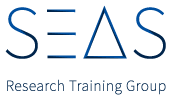Principal Investigators
Political System of Germany
Email:
Media Informatics and Multimedia Systems
Email:
M1 Acceptance and Social Interaction of Humans with Automated Vehicles
Abstract
This project explores the acceptance and cooperation of ACPS in the safety critical domain of mobility. Soon, there will be mixed traffic scenarios in which autonomous vehicles will coexist and cooperate with human traffic participants, including pedestrians and cyclists. Many interactions in urban traffic are not or only weakly legally regulated and observed. Instead, interactions of traffic participants are embedded in established social norms and practices. In this research project, we aim to understand the role of social norms for the recursive relationship between autonomous vehicles and the behavior of human traffic participants. How will automated and autonomous vehicles change social practices of cooperating in urban traffic scenario? Which social cues in addition to the technical signals of an automated vehicle are necessary for the acceptance of autonomous vehicles in daily road traffic? To answer these questions M1 draws on theoretical insights from behavioral social science and computer science. In methodological terms, M1 implements a rigorous set of experimental designs, ranging from large-scale online experiments to VR- and field-scenarios.
Research Questions and Objectives
This research project explores the social embedded interaction between humans and autonomous vehicles in future mixed-traffic situations, and how technical and regulatory measures can be designed to foster prosocial cooperation.
Theories and Key Concepts
The project defines the interaction between humans and autonomous vehicles as involving the behavioral interaction itself and the social context in which it takes place.
It divides the analysis into two categories:
1. **Formal norms**: These are the regulations and standards that govern behavior in traffic situations involving autonomous vehicles. The analysis includes identifying citizen and stakeholder preferences, normative considerations, and their alignment.
2. **Informal norms**: These norms come into play when formal rules are insufficient or deviated from. The analysis looks at positive deviance towards self-driving cars and potential abusive behavior.
Methods
- For formal norms, a survey conjoint experiment was conducted in Germany, Japan, and the United States to identify public preferences and the impact of different policy frames on regulatory preferences.
- For informal norms, a survey experiment is designed to explore prosocial behavior towards self-driving cars and the factors that influence these behaviors. Another experiment investigates deviant behavior and abuse of self-driving cars using virtual reality (VR) and online platforms.
Current Status and Key Findings
- A VR pedestrian simulation study indicated that pedestrians were more deviant towards autonomous vehicles when risk distribution was imbalanced. Legal norm cues were effective in regulating deviant behavior.
- A workshop explored prosocial behavior in traffic, highlighting courteous behavior, indicating apology, and abiding by rules as common dimensions.
- Several papers and posters have been published or presented on topics like the importance of timing in cue signaling for interactions with autonomous vehicles and factors affecting overtrust in these vehicles.
- Ongoing studies are being conducted in VR and online surveys to investigate optimal timing for external human machine interfaces and citizen preferences compared to other stakeholders in the regulatory process.
This project is actively exploring various facets of human-autonomous vehicle interaction, from regulatory preferences to behavioral responses and social norms.
Publications
-
Hatice Sahin Ippoliti, Nina Trilck, Marion Koelle, and Susanne Boll. 2023. Please, Go Ahead! Fostering Prosocial Driving with Sympathy-Eliciting Automated Vehicle External Displays. Proc. ACM Hum.-Comput. Interact. 7, MHCI, Article 218 (September 2023), 18 pages. https://doi.org/10.1145/3604265
-
Hatice Şahin İppoliti, Angelique Daudrich, Debargha Dey, Philipp Wintersberger, Shadan Sadeghian, and Susanne Boll. 2023. A Real Bottleneck Scenario with a Wizard of Oz Automated Vehicle - Role of eHMIs. In Proceedings of the 15th International Conference on Automotive User Interfaces and Interactive Vehicular Applications (AutomotiveUI '23). Association for Computing Machinery, New York, NY, USA, 280–290. https://doi.org/10.1145/3580585.3607173
-
Hatice Şahin İppoliti, Mark Colley, Debargha Dey Information Sciences, Azra Habibovic Scania CV, Andreas Löcken, Andrii Matviienko, Heiko Müller, Shadan Sadeghian, Philipp Wintersberger, Susanne Boll. Introducing SPAT: Development and Validation of Situational Prosocial and Aggressive Behavior Perception in Traffic Scale. Under review in the 2024 CHI Conference on Human Factors in Computing Systems (CHI '24). Association for Computing Machinery, New York, NY, USA.
-
Hatice Şahin İppoliti, Alexander Weibert Robert, Dietrich Manstetten, Larbi Abdenebaoui. Analysis of Driver and Pedestrian Gesture Use in Traffic. Automated Vehicles May Need More Than Kinematics in Ambiguous Situations. Under review in the 2024 CHI Conference on Human Factors in Computing Systems (CHI '24). Association for Computing Machinery, New York, NY, USA.
-
Hemesath, Sebastian and Markus Tepe (2022) Multidimensional preferences towards the regulation of technological risks. A conjoint experiment on popular support for regulating self-driving cars in Germany, Japan, and the United States (revise and resubmit with Regulation & Governance)
-
Hemesath, Sebastian and Markus Tepe (2022) Framing the approval to test self-driving cars on public roads. Experimental evidence on the causal effect of safety and competitiveness in the US, Japan, and Germany (under review with Technology in Society)
-
Hemesath, Sebastian and Markus Tepe (2022) Publicness and the Acceptance of Algorithmic Advice in Hiring Decisions. Evidence from a Cross-National Survey Experiment (revise and resubmit with Public Administration Review)
-
Sahin, Hemesath, Boll (2022): Deviant Behavior of Pedestrians: A Risk Gamble or Just Against Automated Vehicles? How About Social Control? Frontiers in Robotics and AI.
-
Sahin, Hatice: “Prosocial Interaction between Vulnerable Road Users and Automated Vehicles”, International ACM Conference on Automotive User Interfaces and Interactive Vehicular Applications 2020, Doctoral Colloquium.
-
Sahin, Hatice: “Prosocial Interaction between Vulnerable Road Users and Automated Vehicles”, MobileHCI 2020, WeCAReWorkshop,



